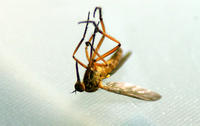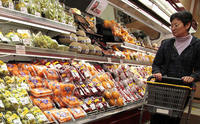-
Tap water in Copenhagen contaminated with E.coli
Parts of the Danish capital Copenhagen were without clean drinking water Saturday after high levels of the E.coli bacteria were detected in the municipal tap water system
-
-
Mosquitoes' last supper

Inhibiting a molecular process cells use to direct proteins to their proper destinations causes more than 90 percent of affected mosquitoes to die within forty-eight hours of blood feeding; the approach could be used as an additional strategy in the worldwide effort to curb mosquito-borne diseases like dengue fever, yellow fever, and malaria
-
-
Method used in hunting serial killers can be used against killer diseases
Geographic profiling, a method used in the hunt for serial killers, can help combat infectious diseases; the statistical technique uses the locations of crimes to identify areas in which the serial criminal is most likely to live and work; it was originally developed to help police prioritize suspects, but can now be used to map the locations of diseases to try and identify the source of the disease
-
-
Easing contamination fears in Japan's food industry

With much of Japan’s manufacturing sector, land, and critical infrastructure badly damaged from the March 11 earthquake and tsunami, dairy and rice manufacturers have struggled to produce enough to feed the nation; Japan produces all of its own milk, rice, and yogurt products, but domestic plants are operating far below full capacity; shortages may persist into the summer; as production ramps up, fears of contamination from radiation leaked from the Fukushima Daiichi nuclear power plant may dampen consumption; one analyst suggests that Japan institute a food tracking program that will allow consumers to track the production of food every step of the way to help ease fears
-
-
Budget cuts will hamper U.S. outbreak response
Public health advocates are criticizing the Obama administration’s 2012 budget request for cutting funding from the U.S. Centers for Disease Control and Prevention’s (CDC) emergency preparedness and core disease prevention programs; advocates believe that these cuts will seriously hamper the ability of the United States to respond effectively to large disease outbreaks or a biological terrorist attack; since 2005 funding for these programs has been reduced by nearly 30 percent, and in 2008 more than 20,000 public health jobs have been cut while thousands of workers have had their hours reduced; GAO reports warn that the federal government needs to strengthen its abilities to respond to pandemics, bioterrorism, and natural disasters
-
-
Edible optical tags to combat counterfeit drugs
A Hawaii-based company offers a new way to combat counterfeit drugs; affix a tiny, readable tag to each pill; the tags are made from clear, 100 percent silicon dioxide, which has been safely used as an ingredient in food and drugs for decades; they are both edible and biologically inert
-
-
U.S. water contains large amounts of the carcinogen hexavalent chromium
Drinking water in thirty-five American cities contains the carcinogen hexavalent chromium; in twenty-five of those cities, the levels exceeded the goal proposed in California, which has been trying aggressively to reduce the chemical in its water supply, a probable carcinogen; the chemical compound was first made famous in the hit 2000 Hollywood movie “Erin Brockovich”
-
-
Mosquito-repelling light barriers will reduce spread of malaria
Malaria accounts for 20 percent of all childhood deaths in Africa; a Columbia University experimental physicist is developing a “light shield” consisting of light barriers that can repel mosquitoes by throwing off the insects’ ability to navigate and detect humans via light and heat
-
-
Senate passes sweeping food safety bill
The Senate passed legislation Tuesday to make food safer in the wake of deadly E. coli and salmonella outbreaks, potentially giving the government broad new powers to increase inspections of food processing facilities and force companies to recall tainted food; the $1.4 billion bill, which would also place stricter standards on imported foods, passed the Senate 73-25
-
-
App to diagnose sexually transmitted infections
Small devices similar to pregnancy testing kits are being developed that will allow people to test themselves privately for sexually transmitted diseases; the kit will include a computer chip around the size of a USB chip, that can be plugged into a phone or computer
-
-
The world is running out of helium
It has taken 4.7 billion years for the Earth to accumulate our helium reserves, which we will have exhausted within about a hundred years of the U.S.’s National Helium Reserve having been established in 1925; there is no chemical way of manufacturing helium, and the supplies we have originated in the very slow radioactive alpha decay that occurs in rocks
-
-
Man addicted to video games successfully challenges end-user agreement
A Hawaii man who sued a company over his crippling addiction to the computer game Lineage II — he claimed that his compulsive urge to play the game caused him to sink more than 20,000 hours into it — has managed to defeat the end-user agreement that said he had no right to bring the case to begin with; the decision may have lasting significance in the software license wars
-
-
"Smart Potty": medical check ups, automatic seat-lowering
Japanese “intelligent” toilets offer users an array of functions — heated seats, water jets with pressure and temperature controls, hot-air bottom dryers, perfume bursts, ambient background music, and noise-masking audio effects for the easily embarrassed; the latest model also offers instant health check-up every time a user answers the call of nature
-
-
NDM-1 may herald the end of antibiotic era
Researchers warn that the spread of a drug-resistant bacterial gene could herald the end of antibiotics; the bleak prediction follows his research into a drug-resistant bacterial gene called NDM-1, or New Delhi metallo-β-lactamase 1, which was first identified in India; researchers identified 143 cases of NDM-1 across India and Pakistan, but 37 — a surprisingly high figure — in the United Kingdom
-
-
Superbug found in British patients returning from treatment in Asia
An antibiotic-resistant superbug has been found in British patients traveling to Asia for cosmetic surgery, cancer treatment, and transplants and returning to Britain for further care; the bug was found attached to E.coli bacteria, but the enzyme can easily jump from one bacterium to another and experts fear it will start attaching itself to more dangerous diseases causing them to become resistant to antibiotics; in Many Asian countries health standards in many Asian countries are poor and regulations are weak, and antibiotics are available to buy without prescription; this is thought to have encouraged resistance to develop as many infections are exposed to the drugs without being properly killed
-
- All
- Regional
- Water
- Biometrics
- Borders/Immig
- Business
- Cybersecurity
- Detection
- Disasters
- Government
- Infrastructure
- International
- Public health
- Public Safety
- Communication interoperabillity
- Emergency services
- Emergency medical services
- Fire
- First response
- IEDs
- Law Enforcement
- Law Enforcement Technology
- Military technology
- Nonlethal weapons
- Nuclear weapons
- Personal protection equipment
- Police
- Notification /alert systems
- Situational awareness
- Weapons systems
- Sci-Tech
- Sector Reports
- Surveillance
- Transportation
Advertising & Marketing: advertise@newswirepubs.com
Editorial: editor@newswirepubs.com
General: info@newswirepubs.com
2010-2011 © News Wire Publications, LLC News Wire Publications, LLC
220 Old Country Road | Suite 200 | Mineola | New York | 11501
Permissions and Policies
Editorial: editor@newswirepubs.com
General: info@newswirepubs.com
2010-2011 © News Wire Publications, LLC News Wire Publications, LLC
220 Old Country Road | Suite 200 | Mineola | New York | 11501
Permissions and Policies
